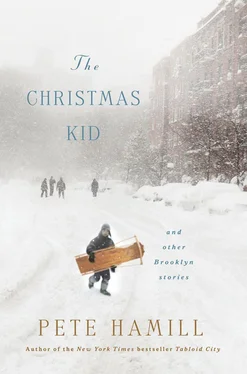Early on Sunday morning, before the rising of the sun, strange cars started appearing in the neighborhood. They had come from all over, from Long Island and Jersey, from the far reaches of Brooklyn, from the upper Bronx. One was driven all the way from Philadelphia. The drivers and passengers were all middle-aged. They parked on the empty streets around the factories, and when they got out, they were hefting baseball bats, tire irons, slabs of metal. They embraced each other, patted their stomachs, laughed, smoked cigarettes.
Then, with Sonny Marino in front, the old Cavaliers started moving through the dark, empty streets. Ahead of them was the headquarters of the Savage Lords, the old tenement where the young hard guys slept. On the top floor, a light burned. In front of the building, Sonny looked at the others, at Nit-Nat, Stark, Wimpy, and the rest, feeling the old summer thrill, then turned and kicked in the front door. The Cavaliers came rushing in, and Sonny shouted up the stairs: “All right, tough guys! Let’s rumble!”
The hospitals in that neighborhood had never before seen so many damaged people on Sunday morning. The fire department said later they could not save the old tenement and let it burn out. Sonny Marino opened for business as usual on Monday morning, his hands hurting, his body aching, a bandage across his left eyebrow. His wife murmured that maybe they should still sell and move to Florida. “Are you kidding?” Sonny Marino said. “I’m gonna live here the rest of my life.”
WHEN LIAM DEVLIN TRUDGED to the door of Rattigan’s that Saturday night, the windows were opaque with steam. It was after midnight, and he was exhausted from a long shift delivering the fat Sunday newspapers. He hesitated for a moment. He could go and eat eggs at the Greek’s, read the paper, then just collapse in bed. But he wanted a beer. One or two, really, and a little television, maybe some music on the jukebox. He opened the door. There were only three customers in the dark, warm saloon, but right away, Liam Devlin wanted to leave. The reason was simple. Jack Parker was drinking at the bar.
“That Parker is a real magician,” the bartender, George Loftus, once said. “He opens his mouth and he makes customers disappear.”
On this night, Jack Parker was drinking alone, facing the beer taps, hatless, a thick mug in his fat pink hand. He didn’t look up when Devlin came in. This was itself unusual. Jack Parker was a cop, and a bully; the bullying was done entirely with words, with wisecracks and scathing remarks. But when he had goaded people to the point where they wanted to break his face, Jack Parker retreated behind the gun. He never used it. But everyone knew he carried it.
“Fleischmann’s and beer,” Devlin said softly to Loftus. “You been busy?”
“Look around,” the bartender said. “It’s like the plague broke out here.”
As always, Devlin started reading the Sunday News from back to front, absorbed in the stories from spring training. He sipped his Fleischmann’s, and drank half the beer. Two old men drank in silence at the far end of the bar. The wind made a whining sound outside. Then Parker spoke.
“Who are you?” he said.
Devlin turned and saw Parker looking at him, a wet smile on his loose, florid face.
“Nobody,” Devlin said. “I just walked in that door.”
“George, you let anyone in here these days.”
Loftus said, “Don’t start, Jack.”
“I mean, lookit this guy,” Parker went on. “Those pants haven’t had a crease in them since the Dodgers left Brooklyn. The jacket’s like something outta Catholic Charities. And the shoes…”
“We can’t all be fashion plates,” Devlin said.
“And the hair,” Parker said. “You let your hair grow down to your belt, I bet. Like Deanna Durbin.”
Devlin said, “What are you? Fred Astaire?”
Loftus rubbed the back of his neck and leaned forward on the bar. “Hey, we don’t need this, Jack. You understand? We don’t need this. So Jack, leave the kid alone. And Liam, read your paper.”
Parker downed his beer, nodded to Loftus to bring him another, and then stared for a while at himself in the part of the mirror visible behind the whiskey bottles. Devlin walked over to the jukebox. There were Irish songs by the Wolfe Tones and the Barleycorn, some tunes by Sinatra and Johnny Mathis, and a few rock-and-roll songs. He played “Sympathy for the Devil” by the Rolling Stones. The first chords boomed through the bar, and Parker spun around.
“Hey!” he shouted. “Shut that off.”
Devlin ignored him and walked to the bar. He said to Loftus, “Hit me again.”
“I said I don’t want to hear that crap!” Parker said. “Turn it off!”
“He put a quarter in, Jack,” Loftus said. “He can play the jukebox he wants to.”
“I’m tryin’ to think! ”
“I could tell,” Devlin said. “You got a real pained expression on your face.”
“You wise bastid!”
He whirled, his eyes wild, while Mick Jagger and Keith Richards drove the Stones.
There was a gun in Parker’s hand.
“You want noise?” Parker said. “I’ll give you noise.”
He walked over, very casually, and shot at the jukebox. The glass face shattered, the record scraped and died. Then he fired again. The shots were very loud. At the far end of the bar, the two old men looked up. Parker turned to Devlin.
“There,” he said. “How do you like that?”
Devlin didn’t answer. His hand trembled.
“You want rock and roll? I’ll give you rock and roll,” Parker said, and walked back to the bar. “Didn’t you read in the paper? Rock and roll is dead.” He placed the gun beside his beer mug. Loftus gave Devlin a look that said: Don’t move. Then he went to Parker.
“That’s enough, Jack,” Loftus said. “I think you oughta head home.”
“Home? What home? What do I got at home? What’s that mean, home? Answer me that, George.”
“You got a wife at home,” Loftus said. “A nice lady. You got kids. You got a nice warm bed. Go home.”
“I had a wife,” Parker said. He turned to Devlin again. “What are you lookin’ at? This is none of your business, shmuck.”
Devlin came at him in a rush, reaching for the gun, hurtling at the older man as quickly as he could. It was not quick enough. Parker grabbed the gun, spun, and slammed Devlin on the skull with the butt. Devlin fell, and then Parker kicked him. The two old men headed for the door.
“Stop right there!” Parker said. “You’re not going nowhere.”
They shuffled back to the bar. Devlin pulled himself up, climbing a stool rung by rung, as if it were a ladder. Parker faced him, an elbow on the bar. The gun was beside the beer mug.
“All right, punk. Now, I want an apology.”
Devlin touched his head, and his fingertips came away red. “Apology for what?”
“For livin’, punk.”
“Go to hell,” Devlin said.
Parker picked up the gun, his eyes wild now, and fired a shot into the ceiling.
“You better apologize, or you’re a dead man.”
Loftus leaned in. “Jack—”
Parker whirled and backhanded the smaller man.
“You shut up, George. This is between me and him. Me and this punk!”
Loftus said, “You’re gonna get in trouble, Jack.”
“Oh, yeah?” He waved the gun as if it were a toy. “Trouble, huh? Trouble!?! ”
He fired at the TV set and missed. Then he stared at the mirror and the bottles, extended his arm, and fired two more shots. The mirror smashed and fell in huge jagged shards. Bottles broke, tipped over, bounced on the floor. The noise was ferocious. And then the bar was silent.
“Trouble,” Parker said to himself in a flat voice. “Trouble.”
Читать дальше












